
-
Find the right food for your petTake this quiz to see which food may be the best for your furry friend.Find the right food for your petTake this quiz to see which food may be the best for your furry friend.Featured products
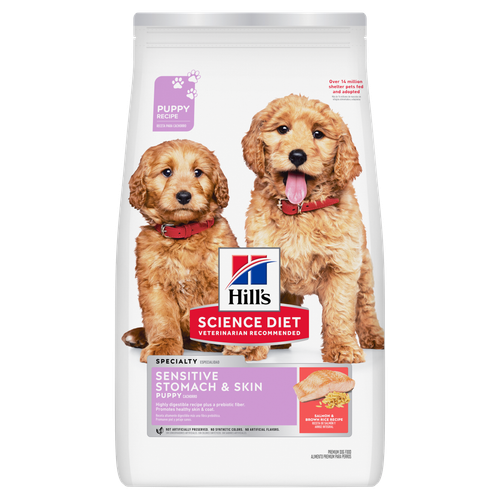 Puppy Sensitive Stomach & Skin Salmon & Brown Rice Recipe
Puppy Sensitive Stomach & Skin Salmon & Brown Rice RecipeDelicious, highly digestible recipe, gentle on stomachs. Nourishes skin & promotes a lustrous coat
Shop Now Adult Chicken & Barley Recipe Dog Food
Adult Chicken & Barley Recipe Dog FoodSupports lean muscle and beautiful coat for adult dogs
Shop Now Puppy Large Breed Chicken & Brown Rice Recipe
Puppy Large Breed Chicken & Brown Rice RecipeVital nutrients to support 5 essential building blocks for lifelong health
Shop NowFeatured products Kitten Chicken Recipe
Kitten Chicken RecipeVital nutrients to support 5 essential building blocks for lifelong health
Shop Now Adult 7+ Chicken Recipe Cat Food
Adult 7+ Chicken Recipe Cat FoodSupports energy level and beautiful fur in mature cats
Shop Now Adult Urinary Hairball Control Chicken & Rice Recipe Cat Food
Adult Urinary Hairball Control Chicken & Rice Recipe Cat FoodActively supports the health of the whole urinary system
Shop Now -
Dog
- Dog Tips & Articles
-
Health Category
- Weight
- Food & Environmental Sensitivities
- Urinary
- Digestive
- Joint
- Kidney
-
Life Stage
- Puppy Nutrition
- Adult Nutrition
- Senior Nutrition
Cat- Cat Tips & Articles
-
Health Category
- Weight
- Skin & Food Sensitivities
- Urinary
- Digestive
- Kidney
-
Life Stage
- Kitten Nutrition
- Adult Nutrition
Featured articles The Incredible Science Behind Your Pet's Microbiome
The Incredible Science Behind Your Pet's MicrobiomeLearn what a pet's microbiome is, how it contributes to your pet's gut & overall health, and why nutrition is important in maintaining healthy microbiomes.
Read More Pet Food Storage Tips
Pet Food Storage TipsDiscover how and where to store your dry, as well as canned, dog and cat food. Learn how to find the "best before" dates on all Hill's pet food packaging.
Read More Water
WaterDiscover why water is the most important nutrient for your dog or cat to live a healthy life. Find out how much water your pet should consume each day.
Read More -


Your kitty's paws are as important to them as your hands and feet are to you. As a cat parent, it's important to help your cat maintain healthy paws. This quick guide to cat paw care will help you keep all of the cat paw pads in your fur family healthy and clean.
Why Care for Cat Paw Pads?
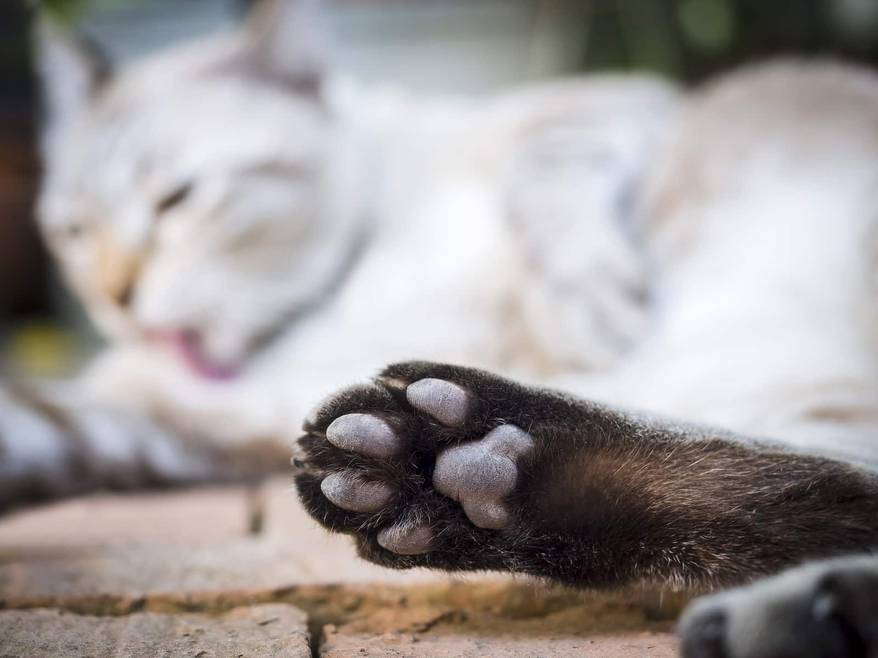
Think for a moment about how cats use their paws. They walk across a variety of surfaces in your house including dirty surfaces such as the litter box. If they're allowed outside on a leash, they may walk across rough and rocky ground, step on thorns and other sharp items, and tread across hot or cold surfaces, depending on the weather. Cats allowed outdoors in the winter are also susceptible to walking through harsh salts and other deicing agents that can be harmful to paws.
At some point in the day, your kitty will take it upon themselves to clean their own paws by licking them, in the process ingesting any harmful substances their little feet may have picked up. Regular cat paw care that includes inspections and cleaning will not only help keep your kitty's paws clean and safe for licking, but also allow you to manage dry and cracked paws, cuts and other injuries before they can become infected.
Cat Paw Care Guide
Getting Started
While inspecting your cat's paws on a regular basis will be good for ensuring you keep them healthy, you can also look for signs that something may be going on with the paws. If you notice your cat is limping or not putting pressure on a certain paw, they might have something stuck in it or could have injured their paw in some manner. Keep in mind that cats are good at hiding their pain, so you may have to pay close attention. Additionally, when a cat is injured they might be less receptive to you inspecting them, so do your best to keep them comfortable and calm while you inspect them.
If your cat isn't used to having their paws handled, you may need to get them accustomed to the idea. It can be helpful to get into the habit of massaging your kitty's paws when you hold or pet them. This will not only help them become accustomed to having their paws touched and handled, but will also help you detect any debris that might be caught between the toes and paw pads.
Paw Inspection
Once your cat tolerates you handling their paws, make it a point to examine them daily, especially after they return from an outdoor jaunt. Look for scratches, sores, and foreign objects, says the Animal Care Clinic in Lexington, Kentucky. If you find something embedded in your cat’s paw, if possible, use a pair of tweezers to gently remove it or call your veterinarian if it's embedded deeply.


Tasty Tips
Paw Cleaning
Either before or after your inspection, use a soft cloth to wipe all those tiny cat paw pads, as well as around the pads and between the toes. This will clean their toes of dirt, litter dust and any chemicals or foreign objects.
Nail Trimming
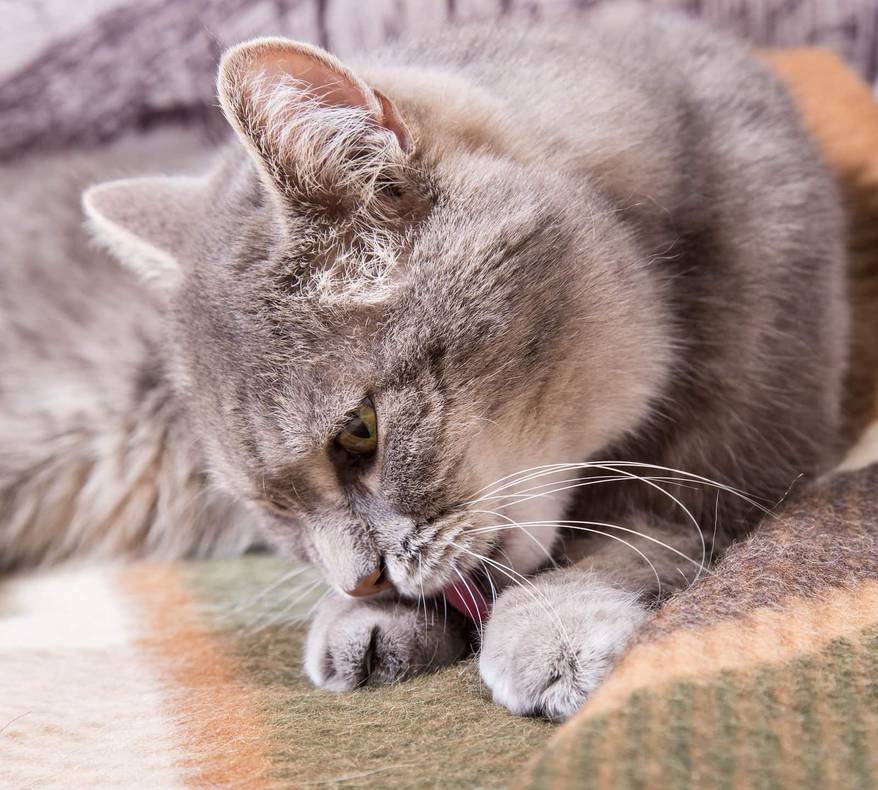
Use a pair of nail scissors made especially for cats to trim cat claws. Be sure to trim just the tips, taking care to avoid the quick (the part of the nail containing sensitive nerves and veins).
If you do accidentally cut into the quick, keep some styptic powder to stop the bleeding. If you don't have any styptic powder on hand, it may be a good idea to buy some at your local pet supply store just in case you need it.
Treating Dry Cat Paw Pads
If your kitty's paw pads become dry, irritated or cracked, contact your vet; they recommend that you try moisturizing them with olive, coconut or another food-quality oil that will be safe for them to lick. You may want to confine them to a bathroom while the oil absorbs to keep her from tracking it through the house. If they need something more heavy-duty, ask your vet to recommend a good paw moisturizer for cats. Avoidotions made for humans, which may be harmful if ingested.
Additional Considerations
Of course, one of the best things you can do for your kitty's paws is to keep them indoors, where they’ll be less likely to become injured or encounter extremely hot or cold surfaces or dangerous chemicals. Dry winter air can dry out your kitty's paws, so consider using a humidifier during cold months. A scratching post can also help keep their nails in good condition — not to mention keeping your carpet and furniture safe from the urge to claw.
With everything involved in caring for cats, it's easy to overlook proper cat paw care. Making a daily habit of checking and cleaning their paws will make it easy to keep them in good shape.


Jean Marie Bauhaus is a pet parent, pet blogger, and novelist from Tulsa, Oklahoma, where she usually writes under the supervision of a lapful of fur babies.
Related products

Supports lean muscle and beautiful fur for adult cats

Actively supports the health of the whole urinary system

Vital nutrients to support 5 essential building blocks for lifelong health

Supports energy level and beautiful fur in mature cats
Related articles
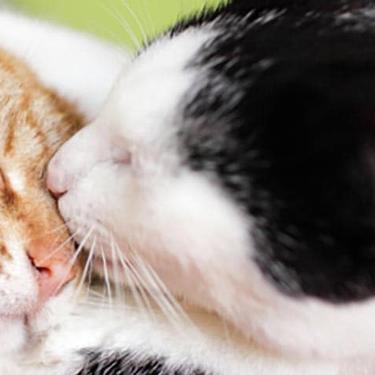
Learn the different factors that might be contributing to your cat's weight gain, and how bigger doesn't always mean better.

What is the best food for an overweight cat? Learn all about weight control food for cats, including what's in it and how it works.
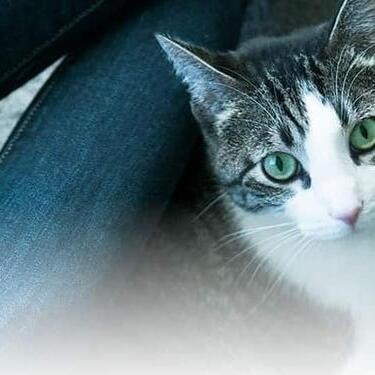
Brushing your cat's teeth is just as important as brushing your own. Learn signs or oral health problems in your cat and how to avoid them.

Discover how to identify cat sensitive skin and what you can do to help your cat thrive from head to paw.

Put your cat on a diet without them knowing
Our low calorie formula helps you control your cat's weight. It's packed with high-quality protein for building lean muscles, and made with purposeful ingredients for a flavorful, nutritious meal. Clinically proven antioxidants, Vitamin C+E, help promote a healthy immune system.
Put your cat on a diet without them knowing
Our low calorie formula helps you control your cat's weight. It's packed with high-quality protein for building lean muscles, and made with purposeful ingredients for a flavorful, nutritious meal. Clinically proven antioxidants, Vitamin C+E, help promote a healthy immune system.

